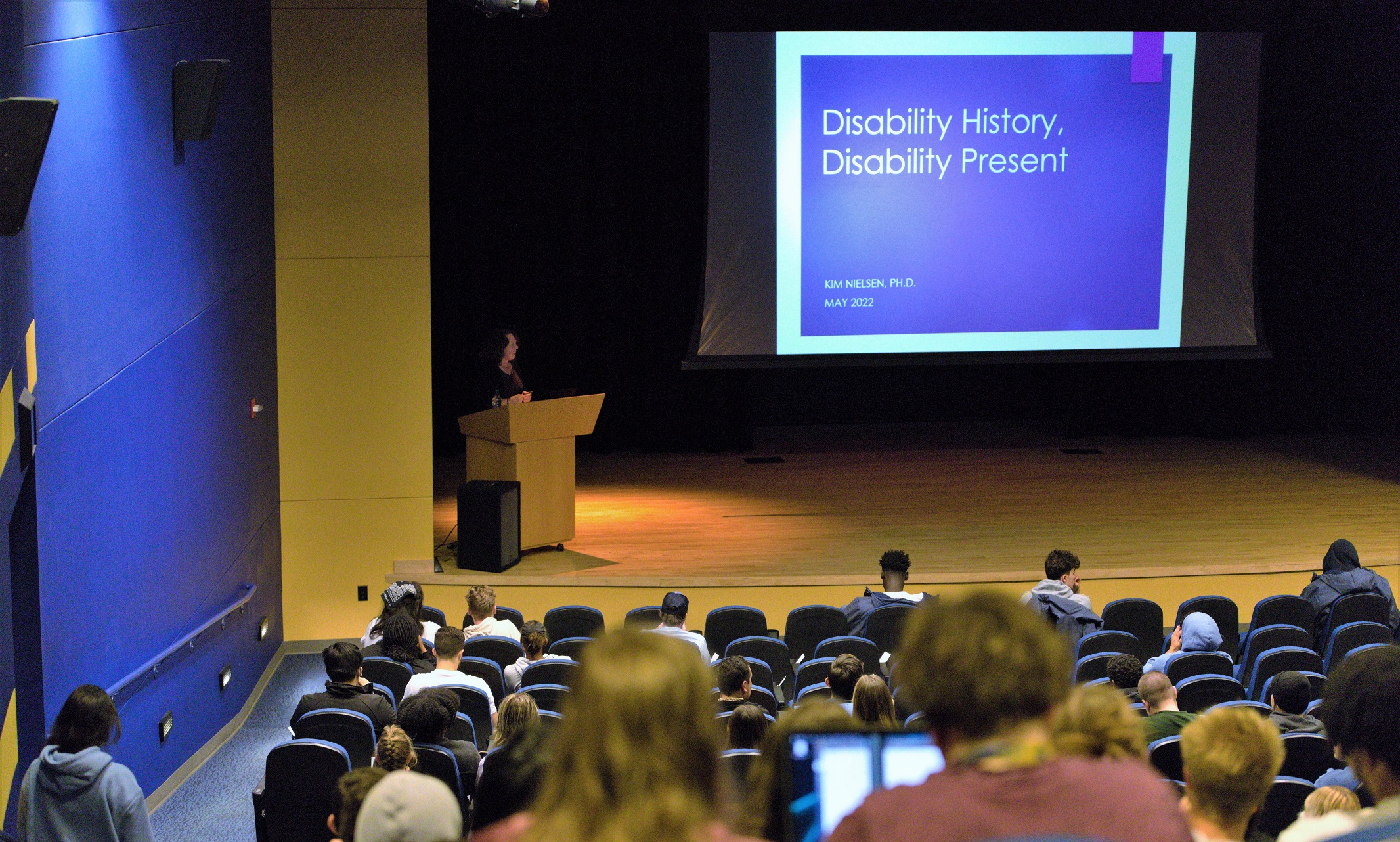Disability is central to U.S. history and shaped the body of the nation, according to Kim Nielsen, Ph.D., an award-winning historian and disability justice advocate.
Nielsen, a distinguished professor of disability studies at the University of Toledo, delivered the 2022 Social Justice Lecture at UMKC on Oct. 20.
She spoke about the history of disability in the United States, why it matters at this moment in time and what disability justice really looks like. She illustrated her talk with stories from history and her personal life.
Nielsen first became interested in disability history when writing - or, as she said, procrastinating on - her dissertation. She was reading far-right-wing publications from the early 1900s when she came across lists of the most dangerous women in America. To her surprise, Helen Keller was on several of these lists. Keller was an author, outspoken advocate for disabled and marginalized peoples and a co-founder of the American Civil Liberties Union. She was wary of being too involved in politics because she was viewed in terms of her deafness and blindness.
“The assumption that disability equated political incompetency effectively silenced her, while her disability did not. It was attitudes, not disability, that was the problem,” said Nielsen. “The story of U.S. history is the story of independence, autonomy and ruggedness. But it’s also a story in which dependence is bad, including any weakness or reliance on others. Disability is stigmatized partly because of this.”
“Disability is not the end of the world. In fact, it can be quite fine. Letting go of ableism will make life easier for all of us."
- Kim Nielsen
Helen Keller’s story was just one example Nielsen gave of the times throughout history that disability was used to stigmatize, silence or exclude people. Several of her stories made the point that disability was used in history to justify racism, sexism, homophobia and more. At different points in history, the concept of disability was used to control immigration, legitimize homophobia and keep women from attending college.
“The categorization of bodies as disabled has always been entwined with other power hierarchies,” said Nielsen. “The definition of disability was shaped by homophobia, antisemitism and classism.”
This moment in time is pivotal for disability justice, Nielsen says. Covid left approximately 19 million people disabled, either temporarily or permanently. The pandemic also contributed to mental health needs for many people. Additionally, experiencing racism can leave physical, emotional and psychological trauma.
“This is our contradiction and our crisis. We are at this national, and perhaps global, moment in which disability justice and activism are flourishing, but ableism and disregard for people with disabilities is also flourishing.”
When speaking on disability justice, Nielsen gave a statement she described as simple but radical.
“Disability is not the end of the world. In fact, it can be quite fine. Letting go of ableism will make life easier for all of us. I believe that if we’re comfortable with disability and dependence, we can more easily ask for help. None of us can do everything. Knowing when and how to ask for help is a really good thing.”
Nielsen is a historian focused on disability history and justice. She is a distinguished professor of disability studies at the University of Toledo. Nielsen is the author of the widely used “A Disability History of the United States,” multiple other books and articles, and co-editor of the award-winning “Oxford Handbook of Disability History.”
In addition, Nielsen has received two Fulbright appointments, numerous scholarly prizes, and a National Endowment for the Humanities Fellowship. She received her Ph.D. at the University of Iowa.
About the lecture series:
The Social Justice Book and Lecture series invites participants to think critically about the historical context of social justice issues and foster a sense of community and dialogue surrounding the issues. Students, particularly first-year students, engage with the chosen book through related coursework, projects and initiatives.
The series is part of Social Justice Month, a time for thought-provoking reflection and engagement for the campus community. A series of events throughout the month focuses on social justice issues at both the local and national level.

